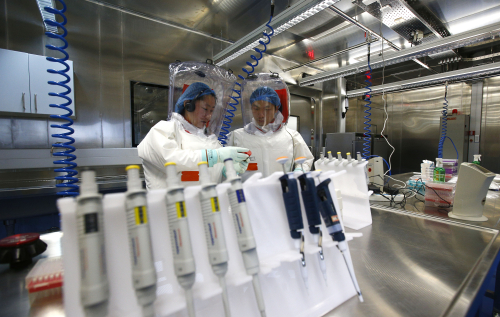|
 |
|
NEW BIO LAB: Researchers take part in a drill at a newly completed high-level biosafety laboratory in Wuhan, central China's Hubei Province, on January 30. The lab, the first in China, will be used to study Class-IV pathogens, the most virulent viruses that pose a high risk of person-to-person infections through the air (YIN GANG) |
Senior Care
Beijing has passed China's first local legislation on home-based care for the elderly, stipulating that children are obliged to support their aged parents.
The bill was passed at the annual full session of the Beijing Municipal People's Congress on January 29 and is scheduled to take effect on May 1.
Under the regulation, children and other caregivers should offer economic and practical support as well as "spiritual consolation" to the elderly.
It also stipulates that the government should offer subsidies and old-age service facilities for the elderly with special difficulties, such as those living on a low income, suffering from disabilities or who have lost their only child.
The legislation defines the scope of responsibilities for the family and the government. It also includes provisions concerning such areas as construction of old-age service facilities in communities and medical and health services.
About 96 percent of elderly people in Beijing rely on home-based care, and the rest live in nursing institutions.
China now has about 200 million people aged 60 and over. The number accounts for some 14 percent of the total population, and is expected to surge to 400 million in 2050. Over 90 percent of the aged people choose home-based pension support nationwide.
Circuit Courts
The Supreme People's Court (SPC), China's highest judicial body, has inaugurated two circuit courts in its latest efforts to reform and branch out so as to bring justice to the doorsteps of ordinary people.
The first Circuit Court of the SPC, covering the provinces of Guangdong and Hainan, and Guangxi Zhuang Autonomous Region, was inaugurated in Shenzhen, Guangdong Province, on January 28. It was followed by the inauguration of the second one based in Shenyang, capital city of Liaoning Province, on January 31, which has jurisdiction over the three northeastern provinces of Liaoning, Jilin and Heilongjiang.
The circuit courts primarily handle major administrative, civil and commercial cases in their regions of jurisdiction that will be heard by the SPC. Both courts began taking cases from February 1.
The establishment of circuit courts of the SPC according to a legal reform package adopted at the Fourth Plenary Session of the 18th Communist Party of China Central Committee in late October 2014 is part of a reorganization designed to better allocate workloads across the country's court system.
Subsistence Allowances
Nearly 71 million poor people, or 5.3 percent of China's 1.3 billion population, enjoyed government subsistence allowances in 2014, Dou Yupei, Vice Minister of Civil Affairs, announced on January 30.
The number includes 52.09 million people who enjoyed rural subsistence allowances and 18.8 million who benefited from urban subsistence allowances.
The government allocated nearly 154 billion yuan ($24.56 billion) for these purposes last year.
To ensure fairness, Dou said the ministry would establish a system to verify the financial status of households and hold accountable those who abuse the fund. | 